- Home
- Daniel Defoe
Moll Flanders Page 9
Moll Flanders Read online
Page 9
All this, you may be sure, was as I wished, and indeed nothing could have happened more perfectly agreeable. I carried it on as far as this with a sort of indifferency that he often wondered at, and I mention it the rather to intimate again to the ladies that nothing but want of courage for such an indifferency makes our sex so cheap and prepares them to be ill-used as they are; would they venture the loss of a pretending fop now and then who carries it high upon the point of his own merit, they would certainly be slighted less and courted more. Had I discovered really what my great fortune was, and that in all I had not full £500 when he expected £1500, yet I hooked him so fast and played him so long that I was satisfied he would have had me in my worst circumstances; and indeed it was less a surprise to him when he learnt the truth than it would have been because, having not the least blame to lay on me, who had carried it with an air of indifference to the last, he could not say one word except that indeed he thought it had been more, but that if it had been less, he did not repent his bargain; only that he should not be able to maintain me so well as he intended.
In short, we were married, and very happily married on my side, I assure you, as to the man; for he was the best-humoured man that ever woman had, but his circumstances were not so good as I imagined, as, on the other hand, he had not bettered himself so much as he expected.
When we were married, I was shrewdly put to it to bring him that little stock I had and to let him see it was no more; but there was a necessity for it, so I took my opportunity one day when we were alone to enter into a short dialogue with him about it. “My dear,” said I, “we have been married a fortnight; is it not time to let you know whether you have got a wife with something or with nothing?” “Your own time for that, my dear,” says he; “I am satisfied I have got the wife I love; I have not troubled you much,” says he, “with my inquiry after it.”
“That’s true,” said I, “but I have a great difficulty about it, which I scarce know how to manage.” “What’s that, my dear?” says he. “Why,” says I, “’tis a little hard upon me, and ’tis harder upon you; I am told that Captain ——” (meaning my friend’s husband) “has told you I had a great deal more than ever I pretended to have, and I am sure I never employed him so to do.”
“Well,” says he, “Captain —— may have told me so, but what then? If you have not so much, that may lie at his door, but you never told me what you had, so I have no reason to blame you if you have nothing at all.”
“That is so just,” said I, “and so generous that it makes my having but a little a double affliction to me.”
“The less you have, my dear,” says he, “the worse for us both; but I hope your affliction is not caused for fear I should be unkind to you for want of a portion. No, no, if you have nothing, tell me plainly; I may perhaps tell the captain he has cheated me, but I can never say you have, for did not you give it under your hand that you was poor? And so I ought to expect you to be.”
“Well,” said I, “my dear, I am glad I have not been concerned in deceiving you before marriage. If I deceive you since, ’tis ne’er the worse; that I am poor, ’tis too true, but not so poor as to have nothing neither”; so I pulled out some bank-bills and gave him about £160. “There is something, my dear,” says I, “and not quite all neither.”
I had brought him so near to expecting nothing by what I had said before that the money, though the sum was small in itself, was doubly welcome; he owned it was more than he looked for, and that he did not question by my discourse to him but that my fine clothes, gold watch, and a diamond ring or two had been all my fortune.
I let him please himself with that £160 two or three days, and then, having been abroad that day and as if I had been to fetch it, I brought him £100 more home in gold and told him there was a little more portion for him; and in short, in about a week more I brought him £180 more and about £60 in linen, which I made him believe I had been obliged to take with the £100 which I gave him in gold as a composition for a debt of £600, being little more than five shillings in the pound and overvalued too.
“And now, my dear,” says I to him, “I am very sorry to tell you that I have given you my whole fortune.” I added that if the person who had my £600 had not abused me, I had been worth £1000 to him, but that as it was, I had been faithful and reserved nothing to myself, but if it had been more he should have had it.
He was so obliged by the manner and so pleased with the sum, for he had been in a terrible fright lest it had been nothing at all, that he accepted it very thankfully. And thus I got over the fraud of passing for a fortune without money and cheating a man into marrying me on pretence of it, which, by the way, I take to be one of the most dangerous steps a woman can take, and in which she runs the most hazards of being ill-used afterwards.
My husband, to give him his due, was a man of infinite good nature, but he was no fool; and finding his income not suited to the manner of living which he had intended if I had brought him what he expected, and being under a disappointment in his return of his plantations in Virginia, he discovered many times his inclination of going over to Virginia to live upon his own, and often would be magnifying the way of living there, how cheap, how plentiful, how pleasant, and the like.
I began presently to understand his meaning, and I took him up very plainly one morning and told him that I did so; that I found his estate turned to no account at this distance, compared to what it would do if he lived upon the spot, and that I found he had a mind to go and live there; that I was sensible he had been disappointed in a wife, and that finding his expectations not answered that way, I could do no less to make him amends than tell him that I was very willing to go to Virginia with him and live there.
He said a thousand kind things to me upon the subject of my making such a proposal to him. He told me that though he was disappointed in his expectations of a fortune, he was not disappointed in a wife and that I was all to him that a wife could be, but that this offer was so kind that it was more than he could express.
To bring the story short, we agreed to go. He told me that he had a very good house there, well furnished; that his mother lived in it and one sister, which was all the relations he had; that as soon as he came there they would remove to another house, which was her own for life and his after her decease; so that I should have all the house to myself; and I found it all exactly as he said.
We put on board the ship which we went in a large quantity of good furniture for our house, with stores of linen and other necessaries, and a good cargo for sale, and away we went.
To give an account of the manner of our voyage, which was long and full of dangers, is out of my way; I kept no journal, neither did my husband. All that I can say is that after a terrible passage, frighted twice with dreadful storms and once with what was still more terrible, I mean a pirate, who came on board and took away almost all our provisions; and which would have been beyond all to me, they had once taken my husband, but by entreaties were prevailed with to leave him—I say, after all these terrible things, we arrived in York River in Virginia, and coming to our plantation, we were received with all the tenderness and affection, by my husband’s mother, that could be expressed.
We lived here all together, my mother-in-law, at my entreaty, continuing in the house, for she was too kind a mother to be parted with; my husband likewise continued the same at first, and I thought myself the happiest creature alive when an odd and surprising event put an end to all that felicity in a moment and rendered my condition the most uncomfortable in the world.
My mother was a mighty cheerful, good-humoured old woman—I may call her so, for her son was above thirty; I say she was very pleasant, good company, and used to entertain me, in particular, with abundance of stories to divert me, as well of the country we were in as of the people.
Among the rest, she often told me how the greatest part of the inhabitants of that colony came thither in very indifferent circumstances from England; that, generally speaking, they
were of two sorts; either, first, such as were brought over by masters of ships to be sold as servants; or, second, such as are transported after having been found guilty of crimes punishable with death.
“When they come here,” says she, “we make no difference; the planters buy them, and they work together in the field till their time is out. When ’tis expired,” said she, “they have encouragement given them to plant for themselves; for they have a certain number of acres of land allotted them by the country, and they go to work to clear and cure the land and then to plant it with tobacco and corn for their own use; and as the merchants will trust them with tools and necessaries upon the credit of their crop before it is grown, so they again plant every year a little more than the year before, and so buy whatever they want with the crop that is before them. Hence, child,” says she, “many a Newgate-bird becomes a great man, and we have,” continued she, “several justices of the peace, officers of the trained bands, and magistrates of the towns they live in that have been burnt in the hand.”
She was going on with that part of the story when her own part in it interrupted her, and with a great deal of good-humoured confidence she told me she was one of the second sort of inhabitants herself; that she came away openly, having ventured too far in a particular case, so that she was become a criminal. “And here’s the mark of it, child,” says she, and showed me a very fine white arm and hand, but branded in the inside of the hand, as in such cases it must be.
This story was very moving to me, but my mother, smiling, said, “You need not think such a thing strange, daughter, for some of the best men in the country are burnt in the hand, and they are not ashamed to own it. There’s Major ——,” says she, “he was an eminent pickpocket; there’s Justice Ba—r, was a shoplifter, and both of them were burnt in the hand; and I could name you several such as they are.”
We had frequent discourses of this kind, and abundance of instances she gave me of the like. After some time, as she was telling some stories of one that was transported but a few weeks ago, I began in an intimate kind of way to ask her to tell me something of her own story, which she did with the utmost plainness and sincerity; how she had fallen into very ill company in London in her young days, occasioned by her mother sending her frequently to carry victuals to a kinswoman of hers who was a prisoner in Newgate in a miserable, starving condition, who was afterwards condemned to die, but having got respite by pleading her belly, perished afterwards in the prison.
Here my mother-in-law ran out in a long account of the wicked practices in that dreadful place. “And, child,” says my mother, “perhaps you may know little of it or, it may be, have heard nothing about it; but depend upon it,” says she, “we all know here that there are more thieves and rogues made by that one prison of Newgate than by all the clubs and societies of villains in the nation; ’tis that cursed place,” says my mother, “that half peoples this colony.”
Here she went on with her own story, so long and in so particular a manner that I began to be very uneasy; but coming to one particular that required telling her name, I thought I should have sunk down in the place. She perceived I was out of order and asked me if I was not well and what ailed me. I told her I was so affected with the melancholy story she had told that it had overcome me, and I begged of her to talk no more of it. “Why, my dear,” says she very kindly, “what need these things trouble you? These passages were long before your time, and they give me no trouble at all now; nay, I look back on them with a particular satisfaction, as they have been a means to bring me to this place.” Then she went on to tell me how she fell into a good family, where, behaving herself well and her mistress dying, her master married her, by whom she had my husband and his sister, and that by her diligence and good management after her husband’s death, she had improved the plantations to such a degree as they then were, so that most of the estate was of her getting, not of her husband’s, for she had been a widow upwards of sixteen years.
I heard this part of the story with very little attention because I wanted much to retire and give vent to my passions; and let any one judge what must be the anguish of my mind when I came to reflect that this was certainly no more or less than my own mother, and that I had now had two children, and was big with another, by my own brother, and lay with him still every night.
I was now the most unhappy of all women in the world. Oh! had the story never been told me, all had been well; it had been no crime to have lain with my husband if I had known nothing of it.
I had now such a load on my mind that it kept me perpetually waking; to reveal it I could not find would be to any purpose, and yet to conceal it would be next to impossible; nay, I did not doubt but I should talk in my sleep and tell my husband of it whether I would or no. If I discovered it, the least thing I could expect was to lose my husband, for he was too nice and too honest a man to have continued my husband after he had known I had been his sister; so that I was perplexed to the last degree.
I leave it to any man to judge what difficulties presented to my view. I was away from my native country, at a distance prodigious, and the return to me unpassable. I lived very well, but in a circumstance unsufferable in itself. If I had discovered myself to my mother, it might be difficult to convince her of the particulars, and I had no way to prove them. On the other hand, if she had questioned or doubted me, I had been undone, for the bare suggestion would have immediately separated me from my husband without gaining my mother or him; so that between the surprise on one hand and the uncertainty on the other, I had been sure to be undone.
In the meantime, as I was but too sure of the fact, I lived therefore in open avowed incest and whoredom, and all under the appearance of an honest wife; and though I was not much touched with the crime of it, yet the action had something in it shocking to nature and made my husband even nauseous to me. However, upon the most sedate consideration, I resolved that it was absolutely necessary to conceal it all and not make the least discovery of it either to mother or husband; and thus I lived with the greatest pressure imaginable for three years more.
During this time my mother used to be frequently telling me old stories of her former adventures, which, however, were no ways pleasant to me; for by it, though she did not tell it me in plain terms, yet I could understand, joined with what I heard myself of my first tutors, that in her younger days she had been whore and thief; but I verily believe she had lived to repent sincerely of both and that she was then a very pious, sober, and religious woman.
Well, let her life have been what it would then, it was certain that my life was very uneasy to me; for I lived, as I have said, but in the worst sort of whoredom, and as I could expect no good of it, so really no good issue came of it, and all my seeming prosperity wore off and ended in misery and destruction. It was some time, indeed, before it came to this, for everything went wrong with us afterwards, and that which was worse, my husband grew strangely altered, forward, jealous, and unkind, and I was as impatient of bearing his carriage as the carriage was unreasonable and unjust. These things proceeded so far, and we came at last to be in such ill terms with one another, that I claimed a promise of him, which he entered willingly into with me when I consented to come from England with him, viz., that if I did not like to live there, I should come away to England again when I pleased, giving him a year’s warning to settle his affairs.
I say, I now claimed this promise of him, and I must confess I did it not in the most obliging terms that could be, neither; but I insisted that he treated me ill, that I was remote from my friends and could do myself no justice, and that he was jealous without cause, my conversation having been unblameable, and he having no pretence for it, and that to remove to England would take away all occasion from him.
I insisted so peremptorily upon it that he could not avoid coming to a point, either to keep his word with me or to break it; and this, notwithstanding he used all the skill he was master of, and employed his mother and other agents to prevail with me to alter my
resolutions; indeed, the bottom of the thing lay at my heart, and that made all his endeavours fruitless, for my heart was alienated from him. I loathed the thoughts of bedding with him and used a thousand pretences of illness and humour to prevent his touching me, fearing nothing more than to be with child again, which, to be sure, would have prevented or at least delayed my going over to England.
However, at last I put him so out of humour that he took up a rash and fatal resolution that, in short, I should not go to England; that though he had promised me, yet it was an unreasonable thing; that it would be ruinous to his affairs, would unhinge his whole family, and be next to an undoing him in the world; that therefore I ought not to desire it of him, and that no wife in the world that valued her family and her husband’s prosperity would insist upon such a thing.
This plunged me again, for when I considered the thing calmly and took my husband as he really was, a diligent, careful man in the main, and that he knew nothing of the dreadful circumstances that he was in, I could not but confess to myself that my proposal was very unreasonable and what no wife that had the good of her family at heart would have desired.
But my discontents were of another nature; I looked upon him no longer as a husband, but as a near relation, the son of my own mother, and I resolved somehow or other to be clear of him, but which way I did not know.
It is said by the ill-natured world, of our sex, that if we are set on a thing, it is impossible to turn us from our resolutions; in short, I never ceased poring upon the means to bring to pass my voyage, and came that length with my husband at last as to propose going without him. This provoked him to the last degree, and he called me not only an unkind wife but an unnatural mother, and asked me how I could entertain such a thought without horror, as that of leaving my two children (for one was dead) without a mother and never to see them more. It was true, had things been right, I should not have done it, but now it was my real desire never to see them, or him either, any more; and as to the charge of unnatural, I could easily answer it to myself, while I knew that the whole relation was unnatural in the highest degree.

 Captain Singleton
Captain Singleton An Essay Upon Projects
An Essay Upon Projects Moll Flanders Moll Flanders Moll Flanders
Moll Flanders Moll Flanders Moll Flanders The Further Adventures of Robinson Crusoe
The Further Adventures of Robinson Crusoe Everybody's Business Is Nobody's Business
Everybody's Business Is Nobody's Business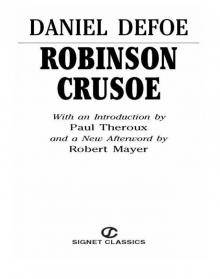 Robinson Crusoe
Robinson Crusoe The Storm
The Storm The King of Pirates
The King of Pirates History of the Plague in London
History of the Plague in London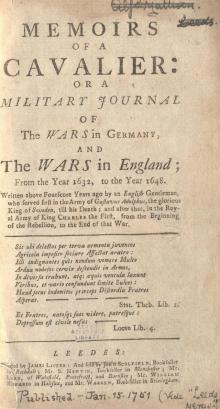 Memoirs of a Cavalier
Memoirs of a Cavalier_preview.jpg) The Life and Most Surprising Adventures of Robinson Crusoe, of York, Mariner (1801)
The Life and Most Surprising Adventures of Robinson Crusoe, of York, Mariner (1801)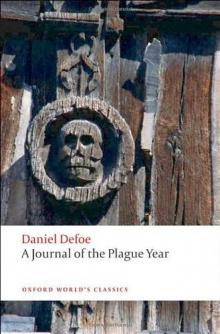 A Journal of the Plague Year
A Journal of the Plague Year_preview.jpg) The Life and Adventures of Robinson Crusoe (1808)
The Life and Adventures of Robinson Crusoe (1808)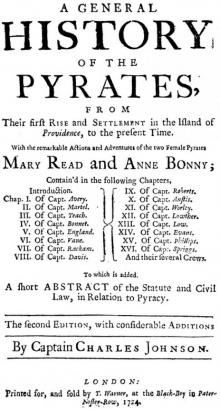 A General History of the Pyrates: / from their first rise and settlement in the island of Providence, to the present time
A General History of the Pyrates: / from their first rise and settlement in the island of Providence, to the present time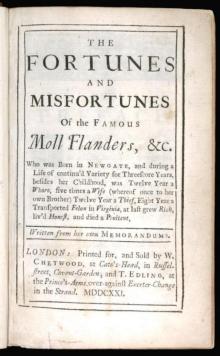 The Fortunes and Misfortunes of the Famous Moll Flanders
The Fortunes and Misfortunes of the Famous Moll Flanders_preview.jpg) The Fortunate Mistress (Parts 1 and 2)
The Fortunate Mistress (Parts 1 and 2)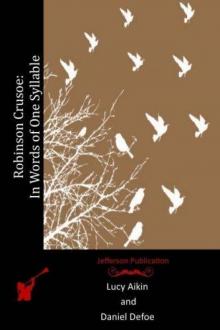 Robinson Crusoe — in Words of One Syllable
Robinson Crusoe — in Words of One Syllable From London to Land's End
From London to Land's End A New Voyage Round the World by a Course Never Sailed Before
A New Voyage Round the World by a Course Never Sailed Before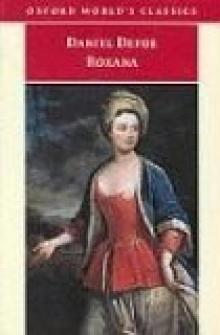 Roxana
Roxana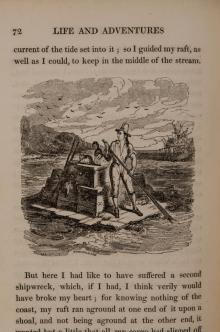 The Life and Adventures of Robinson Crusoe of York, Mariner, Volume 1
The Life and Adventures of Robinson Crusoe of York, Mariner, Volume 1_preview.jpg) Memoirs of Major Alexander Ramkins (1718)
Memoirs of Major Alexander Ramkins (1718) Dickory Cronke
Dickory Cronke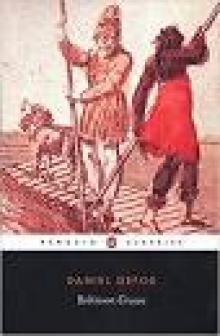 Robinson Crusoe (Penguin ed.)
Robinson Crusoe (Penguin ed.) Moll Flanders
Moll Flanders The Further Adventures of Robinson Crusoe rc-2
The Further Adventures of Robinson Crusoe rc-2